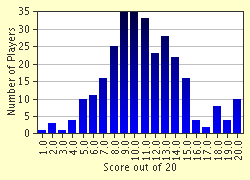Quiz Answer Key and Fun Facts
1. Which of these problems played NO role in the 'Belgian' dissatisfaction about the way the United Kingdom of the Netherlands was being run in the post-Napoleonic years 1815-1830?
2. Which of these non-Belgian politicians supported the creation of a Belgian state so actively that he earned himself the nickname of 'Father of Belgium', especially because of the role he played at the London Conference?
3. Who did the Belgians first try to get as their 'constitutional sovereign' after breaking apart from the United Kingdom of the Netherlands?
4. What 'union' did the Belgian 'Unionists' of the years preceding the Belgian revolution have in mind?
5. As soon as Leopold of Saxe-Coburg-Gotha had ascended the Belgian throne on July 21st 1831, Dutch troops started invading Belgium. Who forced them to withdraw?
6. Which other and even smaller modern European state than Belgium was also born from the breaking apart of the United Kingdom of the Netherlands?
7. The separation from Holland soon turned out detrimental to the economy of especially the Flemish part of Belgium. Which of these elements played NO role in that decline?
8. Already in 1835 counter-measures had been taken to put the economy on track again. Even quite literally, by the opening of a railway system. Which was the first railroad connection in Belgium (which happened to also be the first on the European continent)?
9. Until when did the Belgian government have to pay toll for the use of the mouth of the Scheldt?
10. In 1885 the Belgian King had acquired the state of Congo as his personal possession. In 1908 the Belgian State took it over from him. Who was that King?
11. What part of their territory did the Belgians manage to keep out of German hands till the end of World War I?
12. Where was the King of the Belgians during World War I?
13. In the 1930s the Belgian government made Flanders and Wallonia legally unilingual, but failed to definitely fix the linguistic borders.
14. As a compensation for its efforts in World War One Belgium got a few territorial presents and other rewards. Which of these was NOT one of them?
15. Belgium was less successful in World War Two. How long did it take before she capitulated?
16. At the time of the liberation of Belgium in 1944, King Leopold III was unable to return to his country. Why?
17. Who replaced King Leopold III after riots in the Walloon part of the country had forced him to abdicate in July 1951?
18. 'It was the volunteers of the Belgian underground army themselves who liberated Belgium in 1944'.
19. It took till November 1918 before Belgium got the 'absolute universal suffrage' ('the one man one vote principle'). But it took till 1948 until that voting right was extended to ___________ ?
20. In June 1960 the Belgians gave independence to their Congolese colony. The Belgian Prime Minister who had led this operation was later called by the readers of a prominent American weekly magazine 'The stupidest man of the year'. Who was that poor man?
Source: Author
flem-ish
This quiz was reviewed by FunTrivia editor
gtho4 before going online.
Any errors found in FunTrivia content are routinely corrected through our feedback system.

